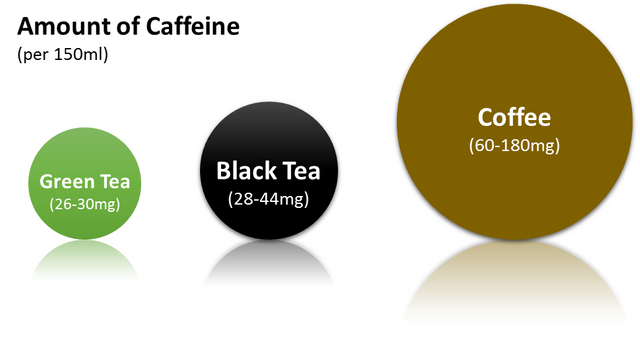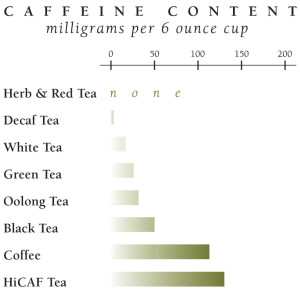Green tea is a popular drink with many health benefits

In fact, some studies have linked green tea with improved brain function and brain aging. It may also reduce the risk of heart disease, type 2diabetes, and cancer.
However, just like regular tea, green tea contains caffeine. This can be a concern for people who want to be aware of or limit their caffeine intake.
This article explores how much caffeine is in green tea and how this type of tea compares to other caffeinated drinks.
What Is Caffeine and What Does It Do?

Caffeine is a naturally occurring chemical found in the leaves, beans, and fruits of more than 60 plants, including the leaves of tea plants.
It’s a central nervous system stimulant that is consumed all over the world to boost alertness and fight fatigue.
It works by blocking the effects of a neurotransmitter called adenosine, which builds up over the course of the day and makes you feel tired.
However, some people may be more sensitive to the effects of caffeine than others.Additionally, people who consume too much caffeine may experience restlessness, insomnia or an irregular heartbeat.
SUMMARY
Caffeine is a naturally occurring stimulant that can help you stay alert and awake. Consuming caffeine may also have some health benefits, such as improved brain function.
How Much Caffeine Is in a Cup of Green Tea?

The average amount of caffeine in an 8-oz (230-ml) serving of green tea is around 35 mg.
However, this can vary. The actual amount can be anywhere between 30 and 50 mg per 8-oz serving.
Since the caffeine in green tea occurs naturally, the amount depends largely on the variety of tea plant, its growing conditions and the way it is processed and brewed.
For example, tea made with older leaves usually has less caffeine than tea made with younger tea leaves.
For example, bagged teas tend to be more caffeinated than loose leaf teas.
This may be because the tea leaves in tea bag s are crushed up, so more caffeine is extracted and infused into the drink.
Finally, the longer you brew your tea and the hotter the water, the more caffeine will make its way into your drink.
SUMMARY
An 8-ounce cup of green tea contains between 30 and 50 mg of caffeine. Powdered green tea like matcha contains more caffeine than loose leaf or green tea bags
Green Tea Contains Less Caffeine than Other Caffeinated Beverages

Caffeine is found in a wide range of beverages like black tea, coffee, soft drinks and energy drinks.
Here’s the caffeine content in 8 ounces (230 ml) of some popular drinks so you can compare the caffeine content (5):
• Green tea: 30–50 mg
• Instant coffee: 27–173 mg
• Plain, brewed coffee: 102–200 mg
• Espresso: 240–720 mg
• Black tea: 25–110 mg
• Yerba mate: 65–130 mg
• Soft drinks: 23–37 mg
• Energy drinks: 72–80 mg
As you can see, the caffeine content per 8 ounces is usually much higher for other caffeinated beverages.
Like green tea, there is a range of caffeine in these drinks. Yet black tea contains, on average, around 55 mg of caffeine per 8 ounces, while brewed coffee contains 100 mg.
SUMMARY
Green tea usually contains around half the amount of caffeine as brewed coffee and less than other caffeinated beverages like black tea, soft drinks and energy drinks.
Is Caffeine in Green Tea Something to Worry About?
For adults over the age of 19, the safe limit is considered to be around 400 mg per day, or 13 mg/pound (6 mg/kg) of body weight (21).
However, to prevent the negative effects of caffeine, it’s often recommended that you space out your caffeine, limiting the amount to around 200 mg at a time.
200 mg of caffeine is around four 8-ounce cups of green tea, so one 8-ounce serving of green tea would put you well within those limits.
Overall, green tea is low in caffeine compared to other caffeinated beverages. As long as you are consuming caffeine within these recommended limits, then the caffeine in green tea shouldn’t be anything to worry about
SUMMARY
Green tea contains less caffeine than other beverages. As long as you are within recommended caffeine limits, the caffeine in green tea should not be a concern.
The Bottom Line
An 8-ounce (230-ml) cup of green tea contains between 30 and 50 mg of caffeine.
The recommended maximum amount of caffeine per day is 400 mg, which is the equivalent to around 8 cups of green tea.
However, it’s best that you don’t drink 8 cups at one time, especially if you are sensitive to caffeine.
Overall, green tea is a nutritious beverage that contains safe amounts of caffeine.
Best of all, drinking it may even have some great benefits for your health.
Hi! I am a robot. I just upvoted you! I found similar content that readers might be interested in:
https://www.healthline.com/nutrition/caffeine-in-green-tea
Wow fantastic bnefits of tea ..
thanks for your apreciation